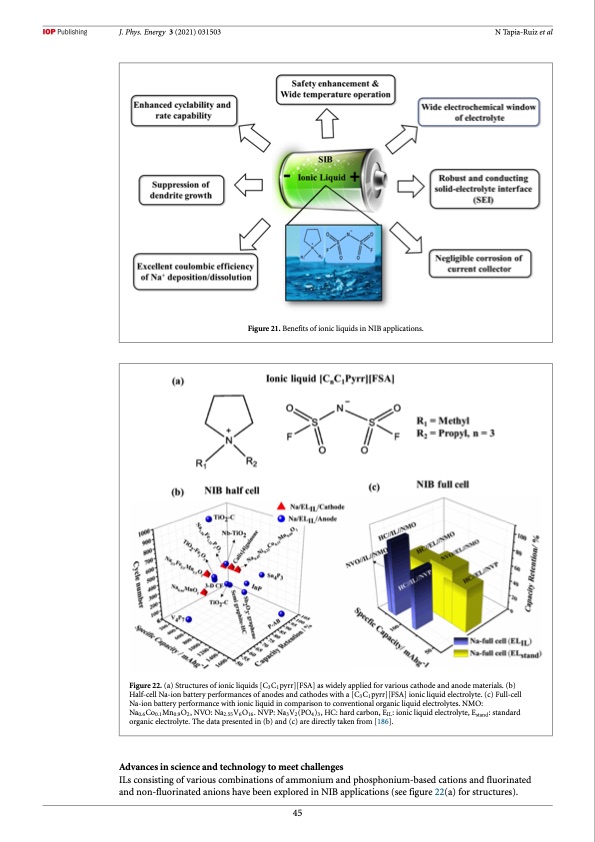
PDF Publication Title:
Text from PDF Page: 046
J. Phys. Energy 3 (2021) 031503 N Tapia-Ruiz et al Figure 21. Benefits of ionic liquids in NIB applications. Figure 22. (a) Structures of ionic liquids [C3C1pyrr][FSA] as widely applied for various cathode and anode materials. (b) Half-cell Na-ion battery performances of anodes and cathodes with a [C3C1pyrr][FSA] ionic liquid electrolyte. (c) Full-cell Na-ion battery performance with ionic liquid in comparison to conventional organic liquid electrolytes. NMO: Na0.6Co0.1Mn0.9O2, NVO: Na2.55V6O16. NVP: Na3V2(PO4)3, HC: hard carbon, EIL: ionic liquid electrolyte, Estand: standard organic electrolyte. The data presented in (b) and (c) are directly taken from [186]. Advances in science and technology to meet challenges ILs consisting of various combinations of ammonium and phosphonium-based cations and fluorinated and non-fluorinated anions have been explored in NIB applications (see figure 22(a) for structures). 45PDF Image | roadmap for sodium-ion batteries

PDF Search Title:
roadmap for sodium-ion batteriesOriginal File Name Searched:
sodium-ion-batteries.pdfDIY PDF Search: Google It | Yahoo | Bing
Product and Development Focus for Infinity Turbine
ORC Waste Heat Turbine and ORC System Build Plans: All turbine plans are $10,000 each. This allows you to build a system and then consider licensing for production after you have completed and tested a unit.Redox Flow Battery Technology: With the advent of the new USA tax credits for producing and selling batteries ($35/kW) we are focussing on a simple flow battery using shipping containers as the modular electrolyte storage units with tax credits up to $140,000 per system. Our main focus is on the salt battery. This battery can be used for both thermal and electrical storage applications. We call it the Cogeneration Battery or Cogen Battery. One project is converting salt (brine) based water conditioners to simultaneously produce power. In addition, there are many opportunities to extract Lithium from brine (salt lakes, groundwater, and producer water).Salt water or brine are huge sources for lithium. Most of the worlds lithium is acquired from a brine source. It's even in seawater in a low concentration. Brine is also a byproduct of huge powerplants, which can now use that as an electrolyte and a huge flow battery (which allows storage at the source).We welcome any business and equipment inquiries, as well as licensing our turbines for manufacturing.| CONTACT TEL: 608-238-6001 Email: greg@infinityturbine.com | RSS | AMP |